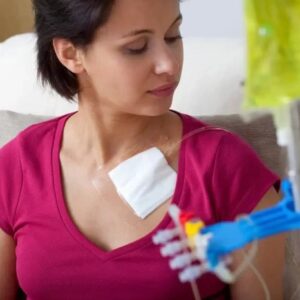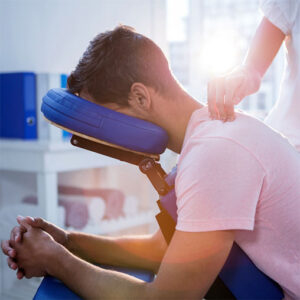What are sleep disorders?
Sleep disorders are conditions that interfere with the ability to fall asleep, stay asleep, or wake up refreshed. These disorders can be short-term or long-term and often affect energy levels, mood, memory, and concentration. While some sleep disorders are occasional and mild, others can be chronic and significantly disrupt daily functioning.
Sleep disorders can include difficulty falling asleep, irregular sleep-wake cycles, interrupted breathing during sleep, or sleep disturbances. People with these disorders are often unaware of the underlying problem and attribute their fatigue to stress or overwork.
Ignoring sleep disorders can have long-term consequences, such as an increased risk of high blood pressure, diabetes, depression, and fatigue-related accidents. Early detection and appropriate treatment are essential to regaining healthy, restful sleep.
Types of Sleep Disorders
- Insomnia
Insomnia is the inability to fall asleep or stay asleep. It is the most common sleep disorder, affecting between 30 and 35% of adults. Insomnia is often associated with other conditions, such as stress, depression, pain, pregnancy, or menopause. Certain medications, such as those for asthma, colds, and allergies, as well as those used for attention deficit hyperactivity disorder, high blood pressure, or Parkinson’s disease, can cause insomnia. Insomnia can be chronic, intermittent, or transient.
- Sleep Apnea
This is a serious condition characterized by pauses in breathing lasting 10 seconds or more during sleep. Sleep apnea can be classified as obstructive sleep apnea, when the upper airway is repeatedly blocked during sleep, reducing or completely stopping airflow, or central sleep apnea, when the brain fails to send the necessary signals for breathing.
- Restless Legs Syndrome
This is an urgent need to move the legs at night, associated with a tingling or prickling sensation, often associated with ADHD and Parkinson’s disease.
- Hypersomnia
This is characterized by the inability to stay awake during the day. It includes narcolepsy, a medical condition causing “sleep attacks” or extreme daytime sleepiness. Hypersomnia is due to disorders of the brain systems that control sleep and wakefulness. Drug and alcohol use can also trigger this disorder.
- Parasomnia
This is a sleep disorder that causes unusual behaviors, such as sleepwalking, sleep talking, moaning, nightmares, bedwetting, teeth grinding, or jaw clenching. Other less common behaviors include sleep texting, sexsomnia, exploding head syndrome, sleep-related hallucinations, sleep scratching, and sleep driving. Parasomnia can be triggered by stress, anxiety, depression, post-traumatic stress disorder, substance abuse, certain medications, irregular sleep schedules, or neurological disorders such as Parkinson’s disease.
Symptoms of Sleep Disorders
Common symptoms of sleep disorders include:
- Feeling intensely sleepy during the day. You may fall asleep at unusual times, such as while driving or working at your desk.
- Difficulty falling asleep, waking up during the night and not being able to return to sleep, or waking up too early.
- Abnormal breathing. This may include snoring, sniffing, gasping, choking, or pauses in breathing.
- Moving while trying to fall asleep. You may feel pins and needles or tingling in your legs or arms.
- Moving excessively or having troublesome movements during sleep, such as twitching in your arms and legs or grinding your teeth.
- Unusual activities during sleep, such as sleepwalking, sleep-eating, or bedwetting.
Causes of Sleep Disorders
There are many types of sleep disorders, and their causes vary greatly. Sleep disorders are often classified according to their cause or effects. They can also be classified according to behavior, sleep-wake cycle disturbances, breathing difficulties, sleep disturbances, or daytime sleepiness.
The exact cause is sometimes unknown, but several factors can increase the risk of developing a sleep disorder.
How are sleep disorders diagnosed?
Your doctor will first perform a physical examination and gather information about your symptoms and medical history. They may also order various tests, including:
- Polysomnography: This is a laboratory sleep study that assesses oxygen levels, body movements, and brain waves to determine how they disrupt sleep. It differs from the at-home sleep self-assessment used to diagnose sleep apnea.
- Electroencephalogram: This test assesses the brain’s electrical activity and detects any potential problems associated with this activity. It is part of a polysomnogram.
- Multiple Sleep Latency Test: This study of daytime naps is used in conjunction with a nocturnal PSG to help diagnose narcolepsy.
These tests can be essential in determining the appropriate treatment for sleep disorders.
Treatment and Management of Sleep Disorders
Effective treatment of sleep disorders often requires a multifaceted approach tailored to each condition. Doctors often recommend a combination of medical treatments and lifestyle changes to address symptoms and underlying causes.
- Use of Sleep Aids or Melatonin
Melatonin supplements help many people improve sleep quality. This laboratory-produced version of the natural sleep hormone is most effective when taken about two hours before bedtime. Try it first for temporary insomnia or jet lag, rather than as a long-term solution. However, if melatonin doesn’t provide relief after a week or two, it’s best to discontinue use.
Prescription sleep aids may be recommended for specific sleep disorders.
- Try therapies or relaxation methods
Cognitive behavioral therapy has been shown to be more effective than prescription sleeping pills in treating chronic insomnia. Moreover, unlike sleeping pills, CBT addresses the root causes of sleep disturbances rather than simply relieving symptoms.
Relaxation techniques help activate the body’s natural response:
- Deep breathing exercises reduce stress hormones.
- Progressive muscle relaxation helps identify tension.
- Meditation and visualization promote mental calm.
- Yoga or tai chi combine physical movement with mindfulness.
- Use of devices.
CPAP machines deliver air continuously through the mouth and/or nose, keeping the airway open during sleep. This prevents the breathing interruptions characteristic of sleep apnea. Regular use of CPAP also reduces the risk of heart attack and stroke, and lowers blood pressure.
Adjusting to CPAP therapy can cause discomfort, congestion, or dry mouth. However, heated humidifiers and well-fitting masks can minimize these side effects.
Visit here : Royalpharmacart, https://repurtech.com/the-hidden-benefits-of-laser-teeth-whitening-you-did-not-know/




